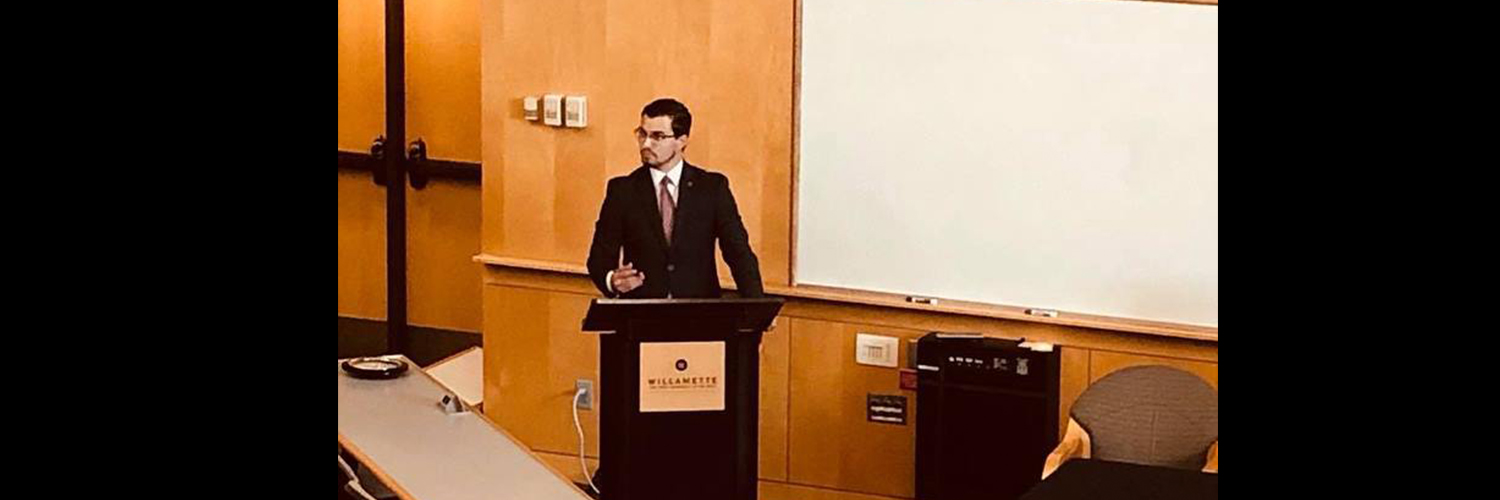Joseph Pickels, law clerk in the Freedom Foundation’s Oregon office, ran rings around a fellow Willamette University Law School student during a Sept. 4 debate asking, “Was Janus v. AFSCME Correctly Decided.”
Then again, he was in the enviable position of defending worker freedom against a corrupt system that, by definition, depends on bullying millions of public employees into waiving their First Amendment rights.
Pickels, in his final year at Willamette Law, cited liberal Justice Lewis Powell’s concurring opinion in Abood v. Detroit School District (1977), which grudgingly conceded that collective bargaining between a governmental jurisdiction and the union representing its employees is necessarily a political endeavor.
“Justice Powell’s concurrence should have been the precedent from which all labor relations cases flowed,” Pickels said. “Public unions have an inherently political cast and function, much like a political party. Collective bargaining in the public sector is ‘political’ in any meaningful sense of the word.”
Responding later to the question of whether Justice Samuel Alito, writing for the majority in Janus, was simply choosing a policy preference from the bench, Pickels asserted the entire premise of the question was flawed.
“The issue for (plaintiff) Mark Janus was not one of policy,” he noted, “but a violation of his constitutional protections.”
The debate was moderated by a Democrat-nominated judge currently sitting on the Oregon Appellate Court.
Much of the event centered on the court’s decision in Janus to overturn Abood — a precedent in which the justices agreed workers could not be forced to pay union dues that were, in turn, used to finance union-embraced political positions but still allowed unions to impose so-called “agency fees” to help pay the cost of collective bargaining.
His opponent insisted Abood, which had remained in force for 41 years, was protected by stare decisis — a legal doctrine under which long-standing legal precedents are typically respected.
Pickels pointed out, however, the court has been gradually reversing its position in Abood for years, in such cases as Chicago Teachers Union v. Hudson (1986), Lehnert v. Ferris Faculty Association (1991), Knox v. SEIU (2012), Davenport v. WEA (2007) and Harris v. Quinn (2014).
The Roberts court, he said, also overturned precedent in Citizens United v. FEC, a case which conservatives love, but also in Obergefell v. Hodges, granting gay marriage rights throughout the country, a decision which leftists were delighted.
When the debate bogged down over Justice Elena Kagan’s dissent in Janus — specifically her accusation that the First Amendment is being used as a weapon — Pickels reached into his suit jacket, pulled out a copy of the U.S. Constitution, and read the First Amendment to the approximately 90 attendees.
He explained the First Amendment specifically protects individuals who speak their mind in order to change serious issues and constitutional violations facing the country.
During the Q&A portion of the debate, Pickels responded to a question about the Trump Administration’s use of executive orders in federal public-sector labor relations by noting that, “As long as liberal-leaning judges assert their authority into areas which they have no authority, the true impact and effect of Janus will never bear fruit.”
Joseph Pickels did the Freedom Foundation proud on Tuesday.












